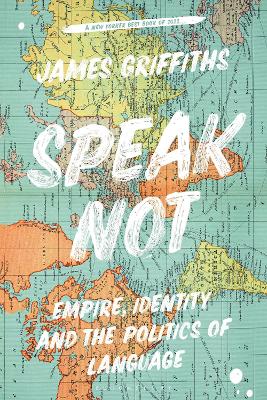
Speak Not
James Griffiths
£13.99
Description
A New Yorker Best Book of 2022
A Globe & Mail Book of the Year
“A stimulating work on the politics of language.” LA Review of Books
As globalisation continues languages are disappearing faster than ever, leaving our planet’s linguistic diversity leaping towards extinction. The science of how languages are acquired is becoming more advanced and the internet is bringing us new ways of teaching the next generation, however it is increasingly challenging for minority languages to survive in the face of a handful of hegemonic ‘super-tongues’.
In Speak Not, James Griffiths reports from the frontlines of the battle to preserve minority languages, from his native Wales, Hawaii and indigenous American nations, to southern China and Hong Kong. He explores the revival of the Welsh language as a blueprint for how to ensure new generations are not robbed of their linguistic heritage, outlines how loss of indigenous languages is the direct result of colonialism and globalisation and examines how technology is both hindering and aiding the fight to prevent linguistic extinction.
Introducing readers to compelling characters and examining how indigenous communities are fighting for their languages, Griffiths ultimately explores how languages hang on, what happens when they don’t, and how indigenous tongues can be preserved and brought back from the brink.
Publisher Review
This history of endangered languages assesses the political causes of their precariousness. * The New Yorker * A welcome addition to critiques of empire and studies of language and politics. Part history, part memoir, part policy critique, the volume succeeds at telling a universal tale through particular stories, including characters who remind us that the languages we speak - and speak not - are the worlds in which we live, and that such worlds are worth fighting for. -- David Moscrop * The Globe & Mail * Speak Not is an astute, well-researched, and often scholarly meditation on the forces that drive marginal languages out of existence in favor of dominant metropolitan tongues ... [a] stimulating work on the politics of language. -- Oliver Farry * LA Review of Books * A lucid and timely account of languages under threat around the world... illuminating in the extreme. -- Kang Hyun-kyung * The Korea Times * Griffiths is spot on: the survival of many languages-and perhaps the identities that go with them-depends on politics. * Asian Review of Books * Speak Not teases out both differences and similarities between [Griffiths'] examples, be that in the racial dimension or level of state violence in their oppression, with both sensitivity and passion. * Buzz * As languages throughout the world continue to disappear at an alarming rate, James Griffiths' book could not be more relevant. Focusing mainly on the historical trajectories of Welsh, Hawaiian and Cantonese, Griffiths chronicles the contentious and often bloody struggles faced by these languages, weaving the strands of history, culture and linguistics into a fascinating and highly readable narrative. Languages die for many reasons, but the book's central message is that language demise is not merely the natural consequence of modernization and mass media, but is often the result of a calculated authoritarian strategy that sees a common language as a guarantor of political unity. Speak Not is not merely a lament at the loss of the planet's linguistic diversity, but is also a positive record of how the courage and perseverance of beleaguered language communities can preserve and even revive their native tongues. * David Moser, author of "A Billion Voices: China's Search for a Common Language" * Speak Not is a beautifully narrated and intensely smart global history of how languages are destroyed. From Hong Kong to Wales, Hawaii to South Africa, Griffiths artfully guides us through intimate stories of people fighting over decades, often in vain, to protect their linguistic heritage and identities, stories that, when taken together, reveal an oft-unexplored aspect of the "disasters wrought" by colonialism, nationalism, and global inequality. Yet within Griffiths powerful critique of language destruction is a story of hope: a glimpse into a world in which language revitalization is possible. * Dr. Gina Anne Tam, Trinity University, San Antonio, USA * This commendable undertaking adds to the literature highlighting the constitutive role that centuries of imperial rule have played in the modern world. ... Speak not ends with a powerful call to action. * International Affairs *
Find this book on the following lists
-
Non-Fiction Summer Highlights: Language
Browse The List
Book experts at your service
What are you looking for?
